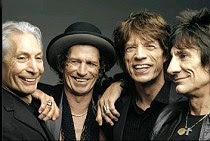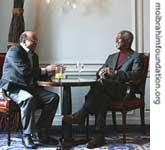 08 April 2007
08 April 2007| From Bob Marley to Franklin Roosevelt, History in Sound | |
 Download
Download Download
DownloadVOICE ONE:
Welcome to THIS IS AMERICA in VOA Special English. I'm Steve Ember.
VOICE TWO:
And I'm Shirley Griffith. This week -- some recorded sounds for all time.
(MUSIC)
VOICE ONE:
The Library of Congress in Washington, D.C., recently added twenty-five sound recordings to its National Recording Registry. Congress established this registry list under a law called the National Recording Preservation Act of Two Thousand.
Recordings are added yearly. They have to be at least ten years old. And they have to be culturally, historically or artistically important.
Members of the public make suggestions online. The library also gathers nominations from experts in music, recorded sound and historic preservation.
VOICE TWO:
The twenty-five new additions chosen by the Librarian of Congress, James Billington, were made between nineteen-oh-four and nineteen eighty-eight. Some are in the library itself. Others are in collections throughout the country. The library is identifying the best existing versions of the recordings. These will be expertly restored, if needed, to protect them for the future.
VOICE ONE:
 |
| Rolling Stones |
Another addition is the nineteen sixty-five hit "Satisfaction" by the Rolling Stones. Also, Paul Simon's nineteen eighty-six album "Graceland," recorded with the South African singing group Ladysmith Black Mambazo.
(MUSIC)
But the list also includes classical pieces like "Il mio tesoro," from "Don Giovanni," sung by tenor John McCormack in nineteen sixteen. And there are spoken word recordings, like one from nineteen sixty by comedian Bob Newhart.
 |
| Bob Marley |
(MUSIC)
VOICE TWO:
That was "Get Up, Stand Up," from the last album that Bob Marley released under the name "The Wailers."
But let us begin our musical trip back in the nineteen twenties -- the Jazz Age. Jelly Roll Morton was one of the pioneers of jazz. He helped spread its popularity in New Orleans, Chicago and throughout the country.
In this nineteen twenty-six recording, Jelly Roll Morton leads his Red Hot Peppers in "Black Bottom Stomp."
(MUSIC)
VOICE ONE:
The National Recording Registry honors memorable words as well as music. The latest additions to the list include "The Osage Bank Robbery" from the radio program "The Lone Ranger." The show was heard December seventeenth, nineteen thirty-seven, making it the earliest known recording from that popular series.
VOICE TWO:
Two brothers rob a bank. The criminals try to hide in an old mine. But they should have know that the Lone Ranger would catch them. Listen now as the hero rides off on Silver, his trusty horse.
(SOUND)
"'High-ho Silver! Away!' A fiery horse with the speed of light, a cloud of dust and a hearty 'High-ho Silver!' The Lone Ranger!"
VOICE ONE:
 |
| President Roosevelt gives his "Day of Infamy" speech to a joint session of Congress, December 8, 1941 |
(SOUND)
FRANKLIN ROOSEVELT: "Yesterday, December seventh, nineteen forty-one, a date which will live in infamy, the United States was suddenly and deliberately attacked by the naval and air forces of the empire of Japan."
VOICE TWO:
World War Two ended in nineteen forty-five.
The years after the war became a time of economic growth in the United States. Many people moved out of big cities and into newly developed suburban communities. Birth rates increased. It became known as the Baby Boom.
The nineteen fifties are remembered as a time when lots of Americans were happy with their lives. But not everyone was.
Allen Ginsberg was a poet but also a social activist. Problems like poverty and inequality angered him. In a nineteen fifty-nine recording, he reads from the opening lines of his most famous poem, "Howl."
ALLEN GINSBERG: "I saw the best minds of my generation destroyed by madness, starving hysterical naked "
(SOUND)
VOICE ONE:
Social activism is also the message of several songs among the newest additions to the National Recording Registry. Fighting racial injustice is the theme of "We Shall Overcome."
Yet Pete Seeger wrote the song as a labor protest. In the first version, he used the line "I shall overcome." But later he changed the word "I" to "we." The song became a theme for the civil rights movement.
Here is Pete Seeger performing "We Shall Overcome" during his concert at Carnegie Hall in New York in June of nineteen sixty-three. People in the audience are singing along.
(MUSIC)
VOICE TWO:
Some people think the greatest singer of the twentieth century was Sarah Vaughan. Her nineteen seventy-three album "Live in Japan" is now added to the National Recording Registry at the Library of Congress.
We leave you with Sarah Vaughan singing "Over the Rainbow."
(MUSIC)
VOICE ONE:
The Library of Congress now has two hundred twenty-five recordings listed in its National Recording Registry. And the library is currently accepting nominations for the two thousand seven registry. The library says it must receive suggestions by July first to be considered for the list.
For a link to the Library of Congress Web site, go to voaspecialenglish.com. You can also find transcripts and audio archives of our programs.
VOICE TWO:
Our show was written by Jerilyn Watson and produced by Caty Weaver. I'm Shirley Griffith with Steve Ember. Join us again next week for THIS IS AMERICA in VOA Special English.



